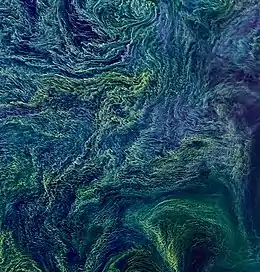Nodularia
Nodularia is a genus of filamentous nitrogen-fixing cyanobacteria, or blue-green algae.[1] They occur mainly in brackish or salinic waters, such as the hypersaline Makgadikgadi Pans,[2] the Peel-Harvey Estuary in Western Australia or the Baltic Sea. Nodularia cells occasionally form heavy algal blooms. Some strains produce a cyanotoxin called nodularin R, which is harmful to humans.
| Nodularia | |
|---|---|
 | |
| Satellite image of a large bloom of Nodularia swirling in the Baltic Sea | |
| Scientific classification | |
| Domain: | Bacteria |
| Phylum: | Cyanobacteria |
| Class: | Cyanophyceae |
| Order: | Nostocales |
| Family: | Aphanizomenonaceae |
| Genus: | Nodularia Mertens 1822 |
| Species | |
|
Nodularia armorica | |
The type species for the genus is Nodularia spumigena Mertens ex Bornet & Flahault, 1886.
Morphology
Nodularia may form solitary filaments or groups of filaments. They reproduce by the formation of hormogonia, filament breakage, and by akinetes .[3]
See also
Kruger, T., Oelmuller, R., and Luckas, B. (2009) Comparative PCR analysis of toxic Nodularia spumigena and non-toxic Nodularia harveyana (Nostocales, Cyanobacteria) with respect to the nodularia synthetase gene cluster. Eur. J. Phycol. 44 (3): 291 - 295.
References
- C. Michael Hogan (2008) Makgadikgadi, The Megalithic Portal, ed. Andy Burnham
- Jiří Komárek and Tomáš Hauer Cyano Database of genera: Nodularia
- Martin Dworkin and Stanley Falkow (2006) The Prokaryotes: a handbook on the biology of bacteria, Published by Springer, ISBN 0-387-25494-3
Line notes
- Jiří Komárek and Tomáš Hauer
- C. Michael Hogan, 2008
- Martin Dworkin and Stanley Falkow, 2006